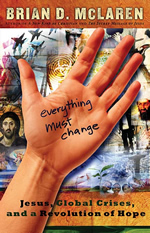
When Brian McLaren left pastoral ministry a few years ago to focus on speaking and writing, one of the first things he wanted to do was grapple with two questions: (1) What are the biggest problems in our world today? And (2) How do the life and teachings of Jesus address these problems.
His analysis of global environmental, poverty, security and spirituality crises is the most clear that I have read. The way we as a global system are consuming resources (the prosperity system), protecting our resources and borders (the security system) and sharing resources (the equity system) is a ‘suicide machine’. We are demanding more resources and producing more waste that the environment can absorb. Military systems sell more weapons than anyone needs, a fraction of the cost of which could care for the basic needs of the world’s poor. In 1969, the incomes of the world’s wealthiest 20% was 30 times higher than the poorest 20%; now the difference factor is 83 times. Developing countries are paying more in debt repayment than they receive in aid. Six million children under 5 starve each year – our annual 21st century holocaust! It is a dysfunctional and psychopathic system.
And the world’s religions including Christianity are challenged to offer healing and answers for the systemic causes of these crises. We need a fresh story that is not just about accumulating, defending and competing: ‘If our framing story tells us that we are free and responsible creatures in a creation made by a good, wise, and loving God, and that our Creator wants us to pursue virtue, collaboration, peace, and mutual care for one another and all living creatures, and that our lives can have profound meaning if we align ourselves with God’s wisdom, character, and dreams for us … then our society will take a radically different direction, and our world will become a very different place’ (p.67). McLaren calls us to grasp the breadth of the gospel, dealing with the mess of the world as well as our souls.
He helped me to imagine what it could be like if we as churches moved beyond polarisation about hot-button issues to grapple with globally serious issues. Why have Christians spent so much time debating the origin of species and not engaged enough with the conservation of the species? Why do churches have widespread commitment to the protection of the unborn but less conviction about helping poor people or not killing enemies who are already born? Why do we spend so much time thinking about our dreams for our churches and less about God’s dream of transformation for the world? Instead of eschatologically guessing how close the end of the world is, how can we explore what world are we leaving for our children?
McLaren does not overly push guilt on his readers but points in the direction of practical responses. To address global security crisis, he urges a divine peace insurgency. To deal with the global equity crisis, he calls for God’s unterror network. To answer the global prosperity crisis, he calls for a new global love economy. He urges new societal systems, living within creaturely limits and using the military not as much for war as alleviating human suffering. He shows how Jesus can and does address these big issues. McLaren paints a fresh picture of Jesus, who ‘inserted into human history a seed of grace, truth, and hope that can never be defeated’ (p.79). Jesus is perhaps better news than we have imagined! And the Bible is perhaps a more powerful story modelling how God and humanity work together to transform society and avert self-destruction.
It paints a big vision – to move us from suicide to hope. But Jesus’ message could potentially change everything, and the stark reality is that everything must change or the world is not sustainable.
This is an easy-to-read yet challenging book for small groups, social justice and mission groups, or anyone interested in the relevance of faith for global issues, and each of its 34 concise chapters concludes with group questions.
As we grapple as Baptist churches with being open to God and how to express hope and mission, this book offers a huge challenge to take this world seriously with its need for peace, justice and environmental preservation This review was originally published as Darren Cronshaw “Everything Must Change: Jesus, Global Crises and a Revolution of Hope’, by Brian D Mclaren (Book Review).” Witness: The Voice of Victorian Baptists 90, no. 10 (2010): 20.
